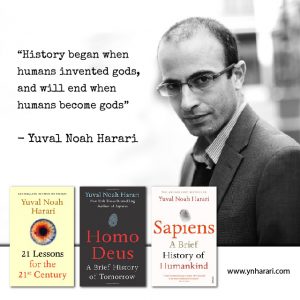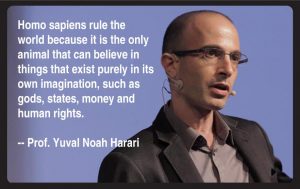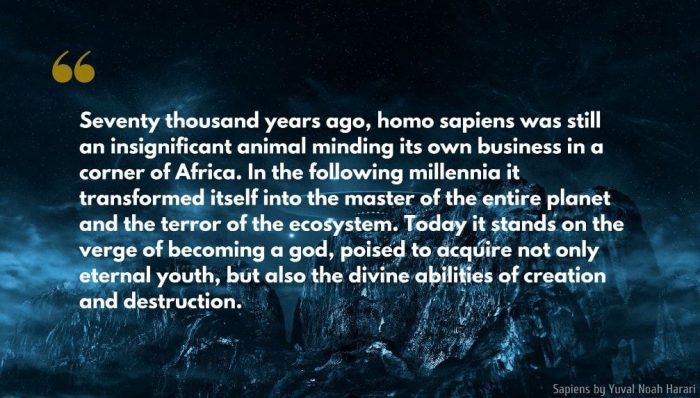
Yuval Noah Harari is an Israeli historian, philosopher, and bestselling author. Here are some key points about him:
Early Life: Harari was born in 1976 in Kiryat Ata, Israel. He completed his undergraduate degree in history at the Hebrew University of Jerusalem and went on to earn a PhD in history from the University of Oxford.
Career: Harari is a professor of history at the Hebrew University of Jerusalem. He has written several bestselling books, including “Sapiens: A Brief History of Humankind,” “Homo Deus: A Brief History of Tomorrow,” and “21 Lessons for the 21st Century.”
Philosophy: Harari’s work often focuses on the intersection of history, technology, and philosophy. He is known for his critical analysis of the impact of technology on human society and for his views on the future of humanity.
Themes: Harari’s work often explores themes such as the evolution of human consciousness, the impact of technology on human society, and the future of humanity. He also examines the role of religion, politics, and economics in shaping human history.
Impact: Harari’s books have been widely read and praised for their accessible style and insightful analysis. His work has been translated into more than 50 languages, and he has been awarded numerous honors and awards for his contributions to the field of history and philosophy.
1 Mark Zuckerberg & Yuval Noah Harari in Conversation
27 apr. 2019
2 Why humans run the world | Yuval Noah Harari
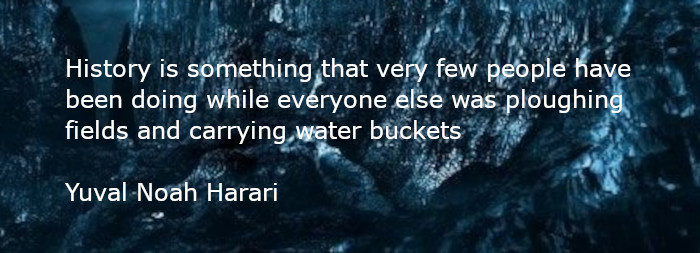
3 Why fascism is so tempting — and how your data could power it | Yuval Noah Harari
8 jun. 2018
4 Yuval Noah Harari & Huawei CEO Ren Zhengfei in Conversation – Davos 2020
22 jan. 2020
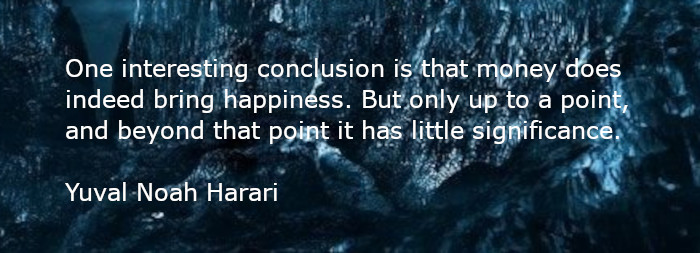
5 How to Survive the 21st Century | DAVOS 2020
23 jan. 2020
6 Yuval Noah Harari: “21 Lessons for the 21st Century” | Talks at Google
11 okt. 2018
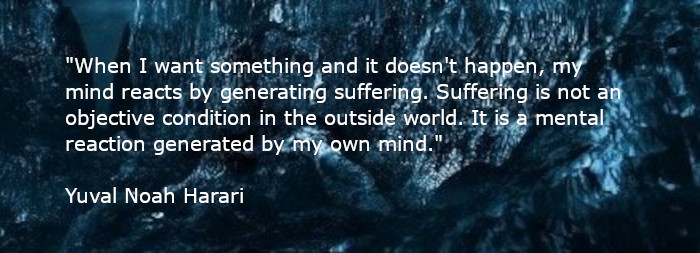
7 Yuval Noah Harari on Vipassana, Reality, Suffering, & Consciousness
14 mei 2018
World renown and trailblazing historian and author (Sapiens, Homo Deus, 21 Lessons for the 21st Century) Yuval Noah Harari was a speaker at the India Today Conclave (March 9, 2018). This is a small clip where he discusses his experience with Vipassana and also some discussion on Reality, Suffering, and Consciousness.
SOURCE
Nationalism in the 21st Century – Yuval Noah Harari at the India Today Conclave 2018
https://youtu.be/8x3zaIYrHTs
SIDE-NOTE:
I attended my first Vipassana 10-day course in Jan 2018, in Kaufmann TX.
* I agree with Harari’s statement “It is the least dogmatic thing I ever encountered in life.”
* Like Harari I want to continue with “practicing Vipassana meditation to see reality more clearly.”
8 Yuval Noah Harari & Tristan Harris: ‘Truth Decay and the Technology Threat
27 jan. 2020
9 Yuval Noah Harari In gesprek met Christine Lagarde
13 sep. 2018
10 Interview Yuval Harari: “Humans are already gods” | Terzake
28 jan. 2020
IMPORTANT VIDEO
11 Yuval Noah Harari and Bari Weiss in Conversation – New York Times ‘Times Talk’
13 sep. 2018
12 Yuval Noah Harari on the myths we need to survive
23 okt. 2015
Want to join the debate? Check out the Intelligence Squared website to hear about future live events and podcasts: http://www.intelligencesquared.com
__________________________
Filmed at the Royal Geographical Society on 23rd September 2015.
Myths. We tend to think they’re a thing of the past, fabrications that early humans needed to believe in because their understanding of the world was so meagre. But what if modern civilisation were itself based on a set of myths? This is the big question posed by Professor Yuval Noah Harari, author of Sapiens: A Brief History of Humankind, which has become one of the most talked about bestsellers of recent years. In this exclusive appearance for Intelligence Squared, Harari will argue that all political orders are based on useful fictions which have allowed groups of humans, from ancient Mesopotamia through to the Roman empire and modern capitalist societies, to cooperate in numbers far beyond the scope of any other species.
To give an example, Hammurabi, the great ruler of ancient Babylon, and the US founding fathers both created well-functioning societies. Hammurabi’s was based on hierarchy, with the king at the top and the slaves at the bottom, while the Americans’ was based on freedom and equality between all citizens. Yet the idea of equality, Harari will claim, is as much a fiction as the idea that a king or rich nobleman is ‘better’ than a humble peasant. What made both of these societies work was the fact that within each of them everyone believed in the same set of imagined underlying principles. In a similar vein, money is a fiction that depends on the trust that we collectively put in it. The fact that it is a ‘myth’ has not impeded its usefulness. It has become the most universal and efficient system of mutual trust ever devised, allowing the development of global trade networks and sophisticated modern capitalism.
Professor Harari came to the Intelligence Squared stage to explain how the fictions that we believe in are an inseparable part of human culture and civilisation.
13 Who Really Runs The World? – Russell Brand & Yuval Noah Harari
13 okt. 2018
14 Yuval Noah Harari and Tristan Harris interviewed by Wired
3 dec. 2018
15 Yuval Noah Harari – The Humanist Challenges of the 21st Century
30 sep. 2018
IMPORTANT VIDEO
16 Yuval Noah Harari & Newsweek Belgium: “The Future of Sapiens”
9 feb. 2020
IMPORATANT VIDEO
17 The Future of Humanity: Yuval Noah Harari in Conversation with Thomas L. Friedman
27 mrt. 2018
13 mei 2019
19 The Role of Scientists in the Debate About Animal Welfare
6 nov. 2017
20 Yuval Noah Harari | Interview | SVT/NRK/Skavlan
21 Lessons – Yuval Noah Harari in Conversation with Jonathan Capehart
23 sep. 2018
22 New Challenges of the 21st Century: Yuval Harari, YES 2019 [Q&A]
23 Sapiens: A Brief History of Humankind – 5 year anniversary
24 Yuval Noah Harari Gives A Brief History Of Tomorrow
30 mrt. 2017
25 Sam Harris & Yuval Harari – Meditation, Religion & God
25 aug. 2017
26 De toekomst van de mensheid – Met Yuval Noah Harari
28 sep. 2016
Dr Yuval Noah Harari legt uit hoe revoluties in de technologie onze maatschappij onze lichamen en hersenen zullen veranderen.
Kijk de QenA hier: https://youtu.be/Lt7votAzI78
Abboneer voor vaste wetenschaps videos: http://bit.ly/RiSubscRibe
TIjdens de geschiedenis waren er verschillende revoluties: In de technologie, economie en in de politiek. Maar een ding bleef telkens hetzelfde: De mensheid zelf. We hebben nogsteeds dezelfde lichamen, dezelfde hersenen en de zelfde gedachten als onze voorouders in China of uit het stenen tijdperk. Onze gereedschappen en scholing zijn totaal verschillend van vroeger maar toch bleven de structuren van het menselijk lichaam hetzelfde.
Toch zal de volgende revolutie verandering brengen in deze geschiedenis. In de 21ste eeuw zullen er opnieuw revoluties zijn in de techonologie, economie en politiek. Maar voor de eerste keer in de geschiedenis zal ook de mens een revolutie ondergaan. Niet alleen onze maatschappij en economie maar ook onze lichamen en gedachten zullen transformeren door deze nieuwe technologie zoals bij genetische wetenschappen, nano technologie en brein computers.
Homo Deus zal u shockeren. Het zal u vermaken maar bovenal zal het je op nieuwe manieren over dingen laten nadenken zoals je dat daarvoor nooit deed. – Daniel Kahneman, schrijver van Thinking, Fast and Slow (Denken, snel en langzaam).
Dr Yuval Noah Harari heeft is gepromoveerd in geschiedenis aan de universiteit van Oxford en geeft daar colleges over allerlei delen van de geschiedenis. ‘Sapiens: Een beknopte geschiedenis van de mensheid’, gepubliceerd in 2014, was een bestseller van de Sunday New York Times en werd wereld wijd in 40 talen vertaald.
27 Yuval Noah Harari: Humankind United?
28 Yuval Noah Harari: ‘Irresponsible politicians undermined public trust in science’
28 mrt. 2020
IMPORTANT VIDEO
29 How Thomas Friedman and Yuval Noah Harari Think About The Future of Humanity
22 mrt. 2018
30 Yuval Harari – Sapiens: A Brief History of Humankind
Live gestreamd op 16 mrt. 2016
.
Live gestreamd op 5 sep. 2018
32 “Learn HOW to Deal With FAILURE!” | Yuval Noah Harari (@harari_yuval) | Top 10 Rules
✎ Yuval Noah Harari’s Top 10 Rules for Success. Need motivation? Watch a Top 10 with Believe Nation! Grab a snack and chew on today’s lessons from a man who went from being born in Israel and working as a professor at the Hebrew University of Jerusalem, to becoming the author of 3 international bestsellers, a highly sought-after speaker on the topics of future of humanity, and one of the most profound thinkers of our time! He’s Yuval Noah Harari and here’s my take on his Top 10 Rules for Success!
★★★ SECRET BONUS VIDEO ★★★ What are the success rules from Steve Jobs, Jeff Bezos, Kanye West, Tony Robbins, and Elon Musk that had the biggest personal impact on me? Find out here: https://www.evancarmichael.com/top10b…
📜 YUVAL NOAH HARARI’S RULES 📜
1. Be adaptive
2. Learn how to deal with failure
3. Be a storyteller
4. Get to know yourself
5. Practice Vipassana meditation
6. Engage with spirituality
7. Study philosophy
8. Read lots of books
9. Develop your social skills
10. Find your mission
11. BONUS – Keep a broad perspective
✈ THREE-POINT LANDING QUESTIONS ✈
1) What is your mission?
2) What book will you start this week to further your mission?
3) What is your story and how can it help promote your mission?
✎ More about Yuval Noah Harari. He first specialized in medieval history and military history in his studies at the Hebrew University of Jerusalem. He completed his DPhil (doctorate) degree at Jesus College, Oxford. He has published numerous books and articles. His book Sapiens: A Brief History of Humankind has been translated into over 30 languages. Harari says Vipassana meditation, which he began whilst in Oxford in 2000, has “transformed my life”. He now specializes in world history and macro-historical processes. Harari twice won the Polonsky Prize for “Creativity and Originality”. He’s a tenured professor in the Department of History at the Hebrew University of Jerusalem. His book Homo Deus: A Brief History of Tomorrow examines possibilities of the future of Homo sapiens. His most recent book is called 21 Lessons for the 21st Century and focuses more on present-day concerns.
33 A conversation with Yuval Noah Harari
In première gegaan op 2 mei 2020
34 Yuval Noah Harari on COVID-19’s Impact on Humankind
16 apr. 2020
35 Coronavirus: Yuval Noah Harari, philosopher and historian, on the legacy of Covid-19 – BBC HARDtalk
5 mei 2020
11 mei 2020
37 Yuval Noah Harari – The Humanist Challenges of the 21st Century
30 sep. 2018
38 Yuval Noah Harari: The 2021 60 Minutes interview
1 nov. 2021
39 Yuval Noah Harari: How to Survive the 21st Century- Davos 2020
24 jan. 2020
41 Yuval Noah Harari reveals the real dangers ahead | The TED Interview
30 jun. 2021
40 Yuval Noah Harari: ‘The World after Covid’, FTWeekend Digital Festival 2021
22 mrt. 2021
42 Yuval Noah Harari on ‘The Bright Side of Nationalism’, at the Central European University
19 mei 2019
43 CLARITY Is POWER: Yuval Noah Harari | ROLLBACK: #392 | Rich Roll Podcast
5 mei 2022
44 Slavoj Žižek & Yuval Noah Harari | Should We Trust Nature More than Ourselves?
18 jul. 2022
00:00:00 Intro
00:02:15 Humans or Nature: Who Should We Put Our Trust In?
00:03:10 You Can Never Violate the Laws of Nature
00:05:23 We Associate Nature with a Pattern that Humans Interrupt
00:10:26 At Least in Some Catastrophe We Can Find Meaning
00:12:08 The Worn-Out Nature Debate Against Homosexuality
00:14:03 ‘Good’ is Often a Misconstrued Concept
00:14:04 Even Buddhism Can be Used to Justify Death
00:18:53 Should We Think of Earth as a Resource?
0020:40 If Something is Good an Extreme Version Must be Better
00:24:53 The Loophole in Deep Ecologist Thinking
00:28:29 Hegel: How Extreme Intentions Contradict Themselves
00:29:40 Is the Idea of Moderation Built into Nature & the Ecosystem?
00:30:40 Equilibrium in Nature
00:33:00 Stalin: The Social Engineer
00:34:14 How Many Scientists Aren’t Seeing the Full Picture
00:42:25 What is Freedom?
00:42:29 How Far Can We Upgrade Until We Downgrade?
00:45:42 A Stalinist Joke About Money
44 AI and the future of humanity | Yuval Noah Harari at the Frontiers Forum
14 mei 2023
In this keynote and Q&A, Yuval Noah Harari summarizes and speculates on ‘AI and the future of humanity’. There are a number of questions related to this discussion, including: “In what ways will AI affect how we shape culture? What threat is posed to humanity when AI masters human intimacy? Is AI the end of human history? Will ordinary individuals be able to produce powerful AI tools of their own? How do we regulate AI?”
The event was organized and produced by the Frontiers Forum, dedicated to connecting global communities across science, policy, and society to accelerate global science related initiatives.
It was produced and filmed with support from Impact, on April 29, 2023, in Montreux, Switzerland.
Yuval Noah Harari is a historian, philosopher, and the bestselling author of ‘Sapiens: A Brief History of Humankind’ (2014), ‘Homo Deus: A Brief History of Tomorrow’ (2016), ’21 Lessons for the 21st Century’ (2018), and the series ‘Sapiens: A Graphic History’ (launched in 2020, co-authored with David Vandermeulen and Daniel Casanave).
Yuval Noah Harari speaks internationally and teaches at the Hebrew University of Jerusalem. On this channel you can see his interviews, lectures, and public conversations with prominent leaders and influencers, — including Mark Zuckerberg, Natalie Portman, Christine Lagarde, Chancellor Kurz of Austria, Jay Shetty, and Russell Brand.
45 Cop Rips Artificial Leg Off Kid To Break Car Window
20 feb. 2019
